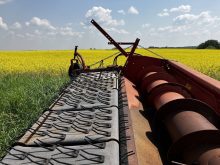Ontario’s plans to harmonize its retail sales tax with the federal GST will jack up the costs of farmers’ “necessities” ranging from fertilizers and pesticides to ag equipment accessories, the provincial Tories warn.
“Even worse, the DST will discourage people from getting into the farming business in the first place,” said Tim Hudak, the opposition Tories’ new leader, in a release Thursday, referring to the harmonized sales tax as the “Dalton Sales Tax” named for Premier Dalton McGuinty.
Read Also

FMC Canada unveils 2026 crop protection roster
FMC Canada’s crop protection lineup for 2026 will include four products marketed for control of kochia.
“Start-up farmers will have to include the cost of the DST in any mortgages they take out to buy new farm property,” Hudak said.
For example, the Tories said, if a starting farmer buys 100 acres of farmland at $10,000 an acre, that farmer would have to pay an additional $80,000 in harmonized sales tax (HST).
“If that farmer takes out a mortgage at five per cent interest for an amortization period of 25 years, they will have to pay an additional $59,585 in interest payments on the DST portion alone,” the party said.
Also, the Tories said, farmers’ point-of-sale exemption, which was in place before the HST was announced, “will be history on July 1, 2010. Dalton McGuinty could have included this in negotiations with the federal government when the HST agreement was being discussed, but he chose to let farmers down instead.”
“Ontario farmers fought hard to have a point-of-sale exemption for sales tax on their farm inputs,” provincial Tory ag critic Ernie Hardeman said in the same release.
“It is a shame that Mr. McGuinty would negotiate that away without understanding the impact on farmers,” said Hardeman, the MPP for Oxford and a former feed dealer.
A spokesman for the Ontario Ministry of Revenue said in an e-mail that in general, the HST would follow the same tax base and structure as the federal GST, and services taxable under the GST would also be taxable under the single sales tax.
However, the spokesman said, as under the GST, businesses, including farms, would generally be able to recover the sales tax paid on purchases of services related to their work in providing a taxable or zero-rated supply, by claiming input tax credits, with “limited exceptions.”
This, in turn, would reduce business costs, he said, most notably in areas that are taxable under the current provincial retail sales tax system. And that, he said, would support business investment in Ontario.
B.C. follows suit
Hudak’s got company in his opposition to a harmonized federal and provincial sales tax, as British Columbia Premier Gordon Campbell on Thursday announced plans for an HST in that province, also by July 1, 2010.
“Even the premier admits that this new tax comes out of the blue. Now British Columbians want to know how much more will they be paying for important services,” B.C. NDP finance critic Bruce Ralston said in a release Thursday.
While he didn’t mention farmers specifically, the Surrey-area MLA noted that “consumers in other jurisdictions that have brought in the HST have seen taxes jump on everything from hydro bills to vet bills, and prices increase for services as diverse as eating out in a restaurant to getting a haircut.”
However, the B.C. government said Thursday that not unlike its current PST exemptions, its HST will give B.C. consumers point-of-sale rebates on products including gasoline and diesel fuel for motor vehicles, books, children’s-sized clothing and footwear, children’s car seats and car booster seats, diapers and feminine hygiene products.
“The PST is an outdated, inefficient and costly tax, some of which is hidden in the price of goods and services and passed on to and paid by consumers,” B.C. Finance Minister Colin Hansen said in a release. “Evidence from the Atlantic provinces showed that the hidden tax is removed very quickly, with the majority of the savings passed through to consumers in the first year.”
B.C. said its HST will come in at 12 per cent, while all other provinces’ current HSTs, and McGuinty’s proposed Ontario HST, are 13 per cent.
However, the Canadian Restaurant and Foodservices Association on Thursday also ripped Campbell’s proposed HST, saying it “will result in a permanent tax shift of hundreds of millions of dollars to our customers.”
The CRFA said the HST “will also discourage local restaurant customers, who can buy the same or similar food tax-free at grocery stores. Grocery stores now offer frozen, heat-and-eat versions of just about every item on a restaurant menu — from lasagna to samosas — and all tax-free.”














